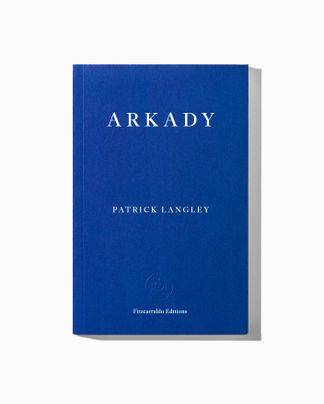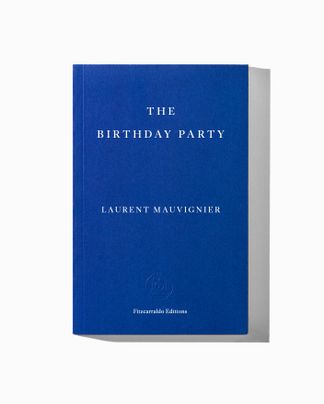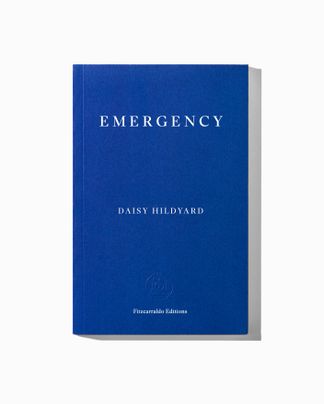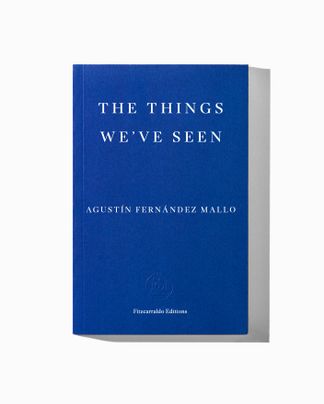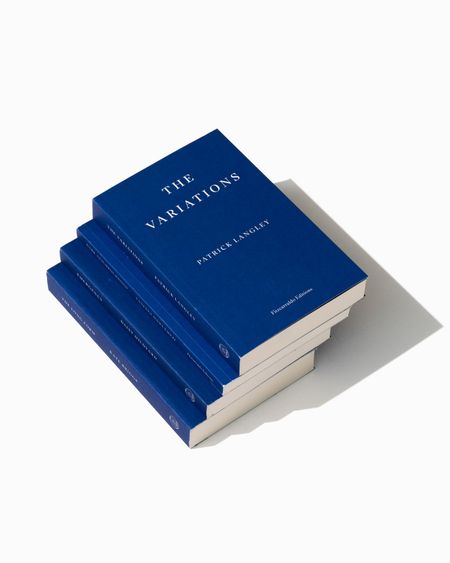Selda Heddle, a famously reclusive composer, is found dead in a snowy field near her Cornish home. She was educated at Agnes’s Hospice for Acoustically Gifted Children, which for centuries has offered its young wards a grounding in the gift – an inherited ability to tune into the voices and sounds of the past. When she dies, Selda’s gift passes down to her grandson Wolf, who must make sense of her legacy, and learn to live with the newly unleashed voices in his head. Ambitious and exhilarating, The Variations is a novel of startling originality about music and the difficulty – or impossibility – of living with the past.
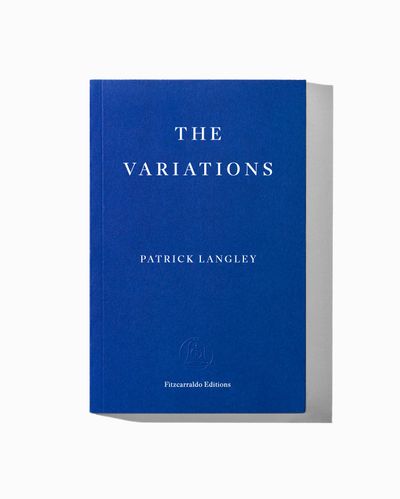
The Variations
French paperback with flaps, 454 pages
Published 7 September 2023
The Variations
On a winter morning in 1518, in the Holy Roman city of Strasbourg, Frau Trauffea started to sing. This was not unusual in itself. But she was in public, in the middle of the street, wearing a gown but no hat in the windblown sleet. A young woman with a round face and long, red hair, she was neither a professional singer nor a beggar. Nor was she singing to any accompaniment – not that anyone else could hear, at least. Passers-by paused and gawped as her gestures grew savage and emphatic. Some, both concerned and confused, dropped offerings at her feet or crossed themselves in prayer. Those who stopped to watch and listen asked Frau Trauffea what she was doing. Others laughed at her, declared her mad, bewitched, possessed – predictable accusations directed now at her clothing, now at her voice.
Noon came and went. Frau Trauffea did not eat, drink, rest, or relieve herself. Her song grew expressive of a soaring anguish, by turns delicate and desperate, emphasized by her upturned gaze and outstretched arms. No soothing word or gentle touch could persuade her to cease her wailing song, which rose and fell and rose again, two low notes followed by two long, high ones, before the melody repeated. Her exertions were brought to a halt when she collapsed in the street, from apparent exhaustion, several hours after she’d begun.
That might have been the end of it: a minor aberration in the city’s psychic life, an outbreak of religious-seeming ecstasy in a century marked by countless similar occasions. After Frau Trauffea had been carried home, where she was fed and watered, rested and recovered, and where, in her first speech since she began, she babbled incoherently about not seeing but being her grandfather’s ghost, her first action, upon waking again, was to get out of bed, wander into the street, and sing, in a manner that suggested no force could prevent her from returning to that precise position in the busy street leading past the bishop’s palace and the bridge to St Magdalena, in the shadow of the intricately pinnacled and ballustraded bell-tower, where she continued to perform as if no time had elapsed since she’d stopped.
She continued in this manner for days, repeating the same compulsion. Rumours flew around the city. Small crowds gathered to watch. Coins, flowers, dried fruit and other offerings would litter the rimed, snow-dusted cobbles upon which she moved. She left them to wither and rot in the sleet that blew in at intervals. The city’s beggar children were delighted to collect the coins and baked goods Frau Trauffea didn’t seem to know, let alone care, had been dropped at her feet.
Who was her husband? Did she have one? Her father, then – where was he? The sight of an unchaperoned woman was, for some, enough.
One day, a young man joined her. He had straw-coloured hair, watery eyes, and wore a long, fashionable navy-blue coat suggestive of modest wealth. Was this her belated husband, returned from the periphery, here to save his wife and in so doing extinguish the spectacle?
He stepped towards her and reached out a hand. Rather than calm her with a rational word, he began humming along, the notes moving in and out of step with hers. The transformation seemed perverse; an aberration which, for several among the crowd, could only be expelled through laughter. Soon he had become like her, singing and moving in the same unpractised and passionate way.
Next morning, this same young man – he had never met Frau Trauffea before the previous day, was no relation or acquaintance – joined her again. And so it followed for a couple of hours, the two of them singing ridiculously, but also, it had to be said, movingly. That afternoon, to the alarmed hilarity of the crowd, a middle-aged woman joined the pair, to form a trio. They sang and moved with no shared music to guide their unpredictable steps and wild gesticulations, despite the bitter winds and biting snows which had begun to whirl around them, obscuring their faces, stinging their eyes, blending their voices into a dissonant drone out of which ugly discords would clang and clash before resolving, unexpectedly, in harmony.
Within a week, some thirty people had joined Frau Trauffea. They were a mixture of men and women, young and old, firm and infirm, but possessed by the same impulse: to sing. None could be persuaded to explain why they were doing it. The sound was atonal, and therefore uncivilized. These deranged figures blocked the street from horses pulling coaches and carts, drawing the attention of the feather-capped guardsmen thumbing the pommels of their swords as they watched and listened to the voices by turns erratic and monotonous, bleating, shouting, nasalizing, howling, sometimes clapping their hands or rattling jewellery. If the singers’ exertions caused injury – a sprained ankle, say, or exhausted vocal chords croaking to silence – it did not slow them down. They were oblivious. If they felt the snow on their hair and shoulders, it made no difference to them: it melted into the sweat of their foreheads and trickled down their straining necks.
(…)
‘Ecstasy is a word I’d happily associate with Patrick Langley’s lyrical and looping novel The Variations, a work with a similarly thrilling Nabokovian intrigue in the relationship between patterning, form and meaning…. The novel’s epigraph – “Variation is among the oldest and most basic devices in music. It originates in an inherent tendency to modify identical recurrence” – is a quote from the American composer Leon Stein, and almost laughably banal when held up against Langley’s humming prose. But its message is clear: it is Nabokov’s magic carpet, that age-old human impulse that – like music – wants to modify, edit, exceed, transcend itself. With The Variations, Langley appears to be weaving a carpet of his own.’
— Matthew Janney, Guardian
‘For all The Variations’ unusual elements, Langley handles traditional storytelling modes expertly. He can nail a character in a few lines…. He can do action. And he has a knack for ending chapters with the expertise of a theatrical director ramping up the tension and then — curtain! — dropping into silence. The Variations, in other words, is a book whose oddness stretches the reader without estranging us. It asks more questions than it answers, but provides plenty of delight to compensate. It’s a novel where, as Selda reflects, “something about the world is revealed, though she can’t say what it is”.’
— John Self, Financial Times
‘Langley’s grandly ambitious second novel … provides a vastly extended sense of family that stretches down the centuries into deep history…. Agnes’s Hospice for Acoustically Gifted Children [is] a creation that can be placed in a line of weird invented institutions in which gifted adepts are gathered: see also Thomas Pynchon’s White Visitation in Gravity’s Rainbow, or David Foster Wallace’s Peoria REC in The Pale King…. [A] valiant attempt to find a narrative form both to reflect and transcend our remorselessly self-centred culture…. The Variations extends our sense of individuality.’
— Paul Quinn, Times Literary Supplement
‘The Variations is a wonderfully mysterious novel suffused with a Lynchian eeriness. I was totally under Langley’s spell and under the thrall of the eerie rhythms governing The Variations. Simply unforgettable.’
— Brandon Taylor, author of The Late Americans
‘If Hilary Mantel’s Beyond Black were written by John Banville channelling M. John Harrison, the result would look something like this. And yet Langley has made something new and unexpected about how the present is, necessarily and always, an echo corridor of the past. Beautifully written, powered by a wonderfully intelligent conceptual dynamo, and deftly sprung with surprises, The Variations is an utterly original book about haunting. It is strange, resonant, and, yes, haunting.’
— Neel Mukherjee, author of The Lives of Others
‘The Variations is a passionate meditation on how past and present meet and annihilate one another in the flare of individual human experience. Music is presented as a kind of weather, blustery and changeable, unlimited by its own time. It takes you up, puts you down, whirls you away. Langley’s prose, lyrical and accurate, enlivens and illuminates. A tremendous, seriously ambitious novel.’
— M. John Harrison, author of Wish I Was Here
‘A novel humming with deep emotional truths and pitch-perfect execution. I loved it.’
— Steven Hall, author of Maxwell’s Demon
‘I thought The Variations was remarkable. I loved its hallucinatory vision of music as both gift and affliction, as a sort of crystallised form of human history. A book of strange and revelatory genius’
— Anna Smaill, author of The Chimes
‘A skilfully told story about inheritance and inspiration, music and time. Langley has a fine eye for detail and scene-making, and The Variations is full of startling observations and images.’
— Martin MacInnes, author of In Ascension
‘[B]rainy, sensitive … the book is by turns funny, elegiac and crude…. The Variations is a curious but vibrant celebration of the unruliness of music.’
— Mark Athitakis, Washington Post
‘[The] lack of focus … can also be its strength: discursive detours into music theory (John Cage, Arnold Schoenberg and Felix Mendelssohn); politics as seen through musical dynamics (Fascism is “all pattern, arbitrary and inflexible… an intolerance of tension”); or the “variations” of heredity (“some variable is always unpredictable, changing, mutating”) trigger Langley’s most effective and explorative prose.’
— Alexander Leissle, Art Review
‘Langley uses the language of music, and of movement, to wrap around something much more propulsive: the difficulty – or impossibility – of living with the past (the past being things that are now gone), of grieving it, or anticipating it.’
— Bryson Edward Howe, The Big Ship
Praise for Arkady
‘A gorgeous novel.… A livid and visionary brotherly love story set among our ruins. I loved it.’
— Max Porter, author of Shy
‘I haven’t been able to stop thinking about [Arkady] – such a tender, hopeful tale of brotherhood and belonging, set against vividly imagined urban topographies. I haven’t read anything like it in ages.’
— Sophie Mackintosh, author of The Water Cure
Patrick Langley’s first novel, Arkady, was longlisted for the RSL Ondaatje Prize and the Deborah Rogers Writers Prize. The Variations is his second novel.

